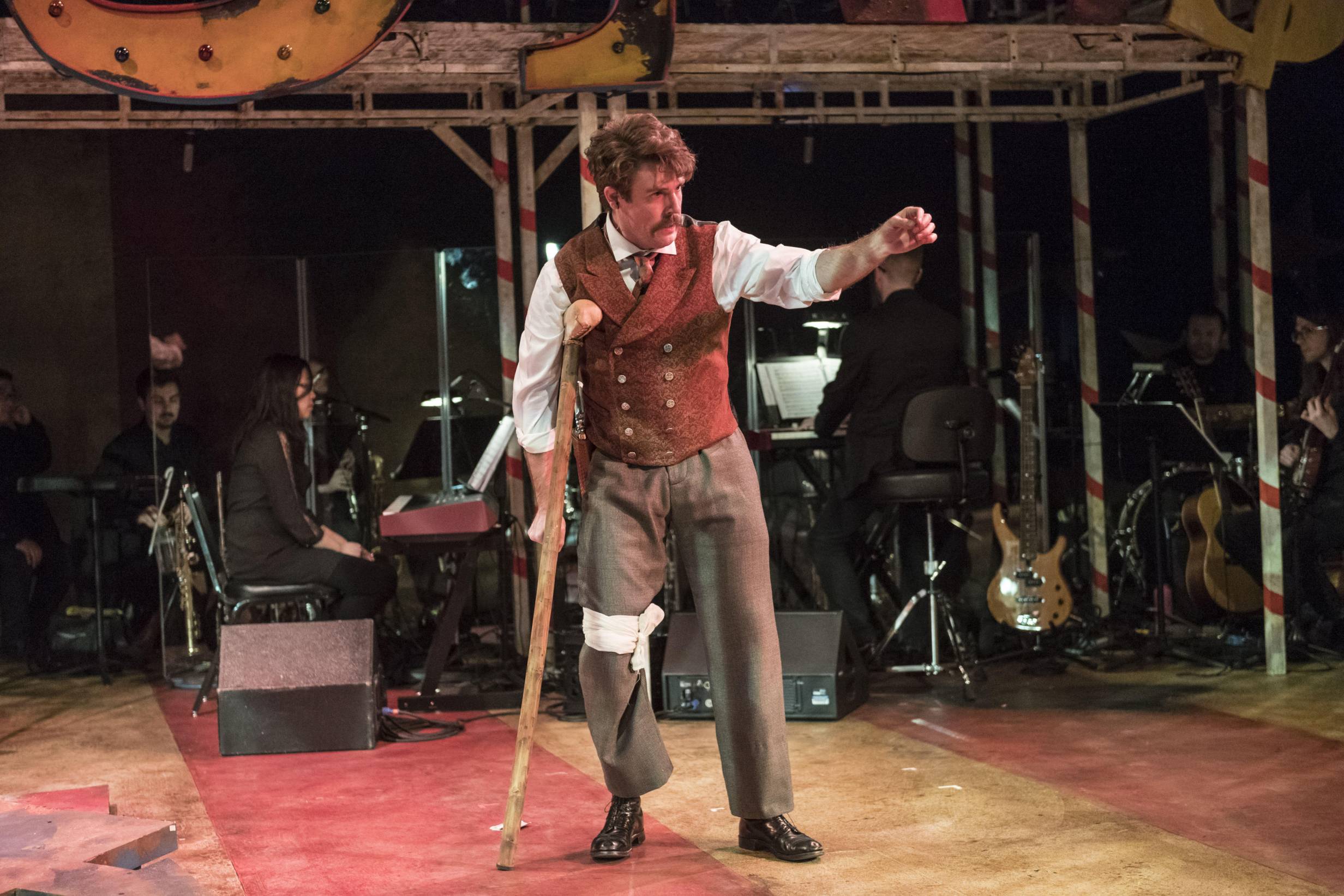I don’t know if it’s a sign of the times that the Dramaturg’s note at the front of the program for Stephen Sondheim’s musical Assassins contained the assurance that, “Assassins does not endorse killing the President of the United States,” or if that caveat also needed to be included in the original Off-Broadway opening in 1990. In performances where the assassins and would-be assassins of Lincoln, Garfield, McKinley, FDR, Kennedy, Nixon, Ford, and Reagan glorify themselves, and in which the audience knows that most of these figures too have gone down in infamy, perhaps it is a good universal disclaimer for all times.
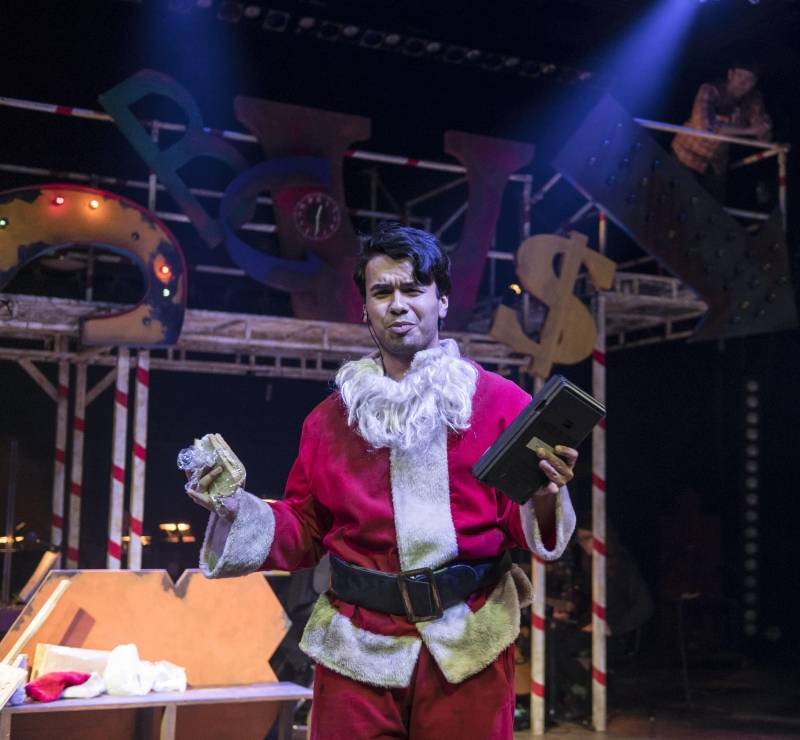
In general, it would help to have a little background on Presidential assassination attempts before seeing this show. To be honest, I could not figure out who the character in the dirty Santa Claus outfit talking into a tape recording was so angry at, until he did a Richard Nixon impression. It was Samuel Byck (Alejandro Mata)— a footnote in assassin history—who had tried, decades before 9/11, to hijack a plane to fly into the White House with the intention of killing Richard Nixon. And who knew that Leon Czolgosz (Ethan Miles Perry) assassin of William McKinley, was influenced by Emma Goldman? Not me. This is a play that will send you to Wikipedia to check on the historical details.
Of course, John Wilkes Booth (Jordan Coughtry) appearing on the upper scaffolding is immediately historically identifiable, and it is he who keeps the “moral” argument of changing the world via assassinations going. Coughtry’s performance as Booth is strong, and both he and the Balladeer (Mark Tyler Miller) provide a continuity to the narrative. However, the conceit of having both a Proprietor (Vincent Williams) and a Balladeer adds a little confusion to a narrative that is already fractured and not bound by a time/space continuum. It is Booth, here, not the CIA or the mafia, who convinces Lee Harvey Oswald (also played by Miller) to kill Kennedy and to join all the other invisibles, under the microscope of assassins, where their every action and childhood slight will be examined by journalists and historians decades into the future.
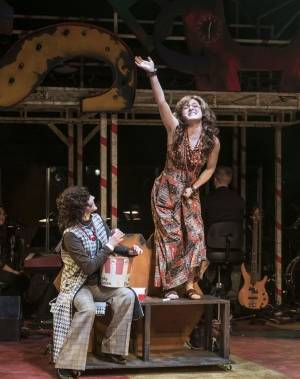 Squeaky Fromme, played energetically by Allie Wessel, is a force, immediately identifiable by her red cape and infatuation with Charles Manson, and Fromme’s eccentric nature plays well against Jacklyn’s Ovassapian’s Sarah Jane Moore, the more conservative seventies housewife, also intent on shooting President Gerald Ford. When they appear in historical sequence, it’s almost refreshing to see some equal opportunity for assassins. They get to play off each other with bumbling intent—think of Lucy and Ethel trying to assassinate a president. They are afforded this comedy partly because neither Ford nor anyone around him was shot, and it’s preposterous, even in retrospect, that two women wanted to assassinate Gerald Ford, perhaps the least passion-inspiring president of all time.
Squeaky Fromme, played energetically by Allie Wessel, is a force, immediately identifiable by her red cape and infatuation with Charles Manson, and Fromme’s eccentric nature plays well against Jacklyn’s Ovassapian’s Sarah Jane Moore, the more conservative seventies housewife, also intent on shooting President Gerald Ford. When they appear in historical sequence, it’s almost refreshing to see some equal opportunity for assassins. They get to play off each other with bumbling intent—think of Lucy and Ethel trying to assassinate a president. They are afforded this comedy partly because neither Ford nor anyone around him was shot, and it’s preposterous, even in retrospect, that two women wanted to assassinate Gerald Ford, perhaps the least passion-inspiring president of all time.
The insane, but nevertheless somehow winning Charles Guiteau (Kevin Woodrow) is played like the music-man of assassins, but is cheated out of a perceived post by James Garfield. Yvon Streacker also does a good job portraying the immigrant Giuseppe Zangara, whose physical maladies somehow caused him to shoot Anton Cermak, the mayor of Chicago, rather than the intended Roosevelt.
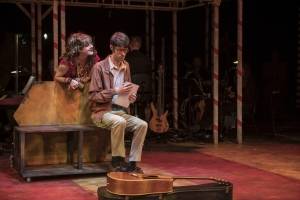 In my opinion, a few musical numbers really stand out in this production. “Unworthy of Your Love,” a duet between John Hinkley Jr. and Squeaky Fromme, highlights their respective obsessions with Charles Manson and Jodi Foster while providing some insight into the commonalities that propel them. We find that in each of these assassins, there is something missing, some invisibleness, the inability to be heard by anyone, which has some causality to their very public act. John Hinkley Jr., played very convincingly by Bradley Wiedrich, is a nerd, geek, someone always in the background, unnoticeable, until of course he shoots at a President. (Reagan is represented by a picture spewing out one-liners.)
In my opinion, a few musical numbers really stand out in this production. “Unworthy of Your Love,” a duet between John Hinkley Jr. and Squeaky Fromme, highlights their respective obsessions with Charles Manson and Jodi Foster while providing some insight into the commonalities that propel them. We find that in each of these assassins, there is something missing, some invisibleness, the inability to be heard by anyone, which has some causality to their very public act. John Hinkley Jr., played very convincingly by Bradley Wiedrich, is a nerd, geek, someone always in the background, unnoticeable, until of course he shoots at a President. (Reagan is represented by a picture spewing out one-liners.)
“Something Just Broke” is an ensemble number that provides some much-needed consideration of how the rest of America reacted to the death of a President, with members of the ensemble remembering exactly where they were when they heard of a President being shot.
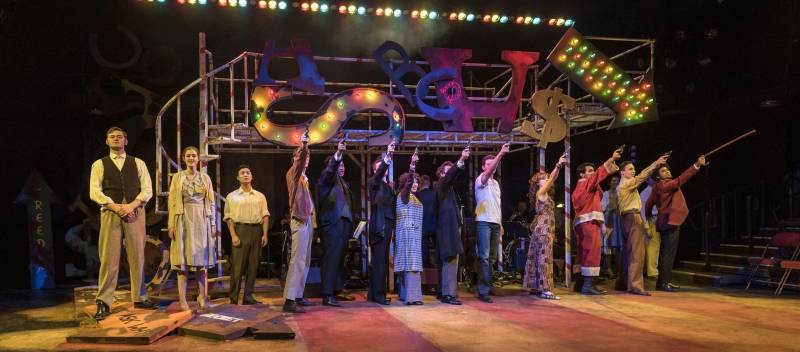
The live orchestra, led by Justin Brauer, was part of the stage set-up, and I found that appealing rather than distracting; however, because of the acoustics in the space, the orchestra sometimes drowned out the ensemble.
The set seemed to be an argument of decaying American ideals, with a the sign declaring “Home of the Free and The Brave” filled with rust. Another sign that contains the word “democracy” is at various time lit to read only “Mocracy,” perhaps suggesting that while the words remain, the infrastructure is crumbling. The lighting mostly kept to the patriotic tones of blue and red, with the grassy knoll of the Kennedy assassination bringing in an element of green.
All upcoming performances have a waiting list, but I recommend Assassins to anyone not averse to guns and looking to dig into this part of America’s history.
Assassins is playing at the Krannert Center Feb. 1 – 11th at varying times. For tickets and more information, click here.
Photos provided by Darrell Hoemann.








